
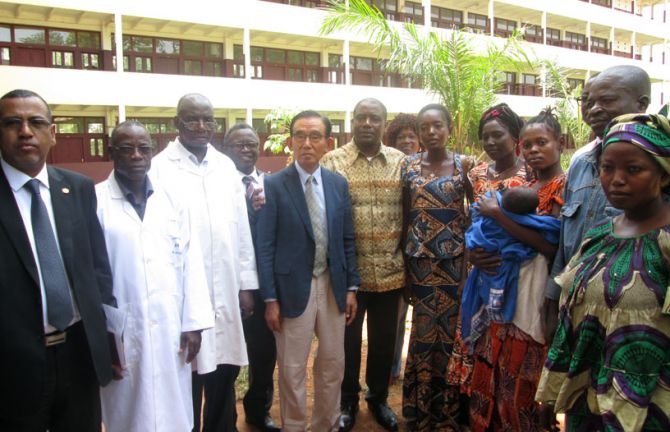
Update
Hundreds of people living with HIV resume treatment in the Central African Republic
17 March 2015
17 March 2015 17 March 2015More than 540 people living with HIV in the capital of the Central African Republic, Bangui, have been able to resume taking antiretroviral therapy owing to a joint project run by UNAIDS and the government of the Republic of Korea.
The recent instability in the country forced many people away from their homes and into camps for internally displaced people, where health services are limited. In addition, many health facilities were destroyed, inaccessible or unstaffed during the crisis. Around a third of people on antiretroviral therapy across the country were unable to continue their treatment.
Social services and community volunteers have located 544 of 1500 people who left treatment programmes in Bangui, enabling them to resume access to the life-saving medication. UNAIDS and the government of the Republic of Korea aim to extend the project to other provinces and to start rebuilding some of the country’s shattered health infrastructure.
A total of 120 000 people were living with HIV in the Central African Republic in 2013, with about 16 500 on antiretroviral therapy.
Quotes
“The resumption of antiretroviral therapy for people living with HIV will certainly facilitate the achievement of the 90–90–90 objectives by 2020.”
“This action fits well within the UNAIDS strategy of Fast-Tracking the AIDS response in cities and mobilizing local communities to accelerate the response to HIV and end the AIDS epidemic by 2030.”
“When the war started, I fled to a camp for displaced people. There, I wasn’t able to get my medicine and my health got worse. I felt like I was going to die. When the social workers came to the camp to tell us we could go to the clinic to resume treatment, I didn’t hesitate. Now I’ve regained my strength and have hope.”
Region/country

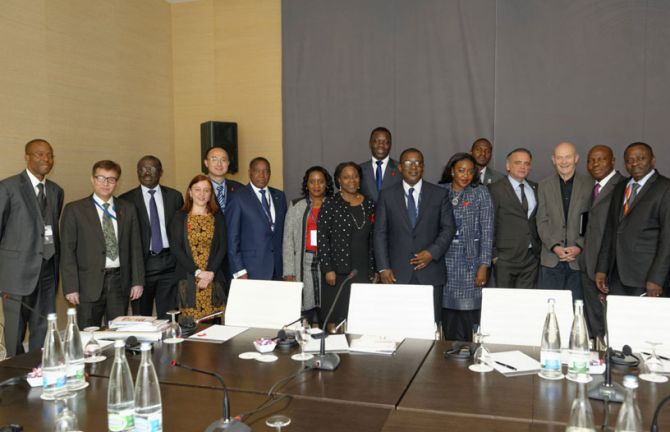
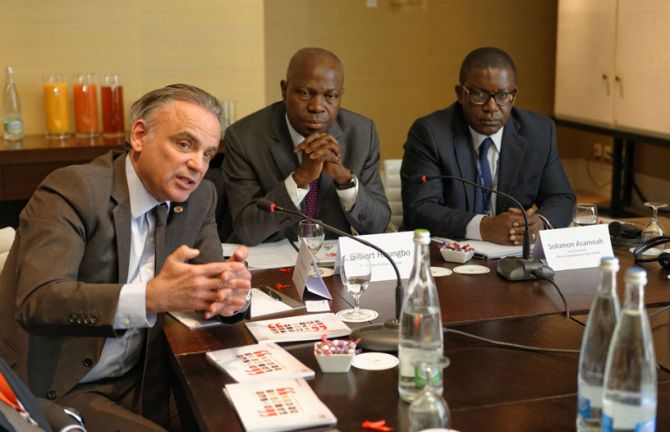
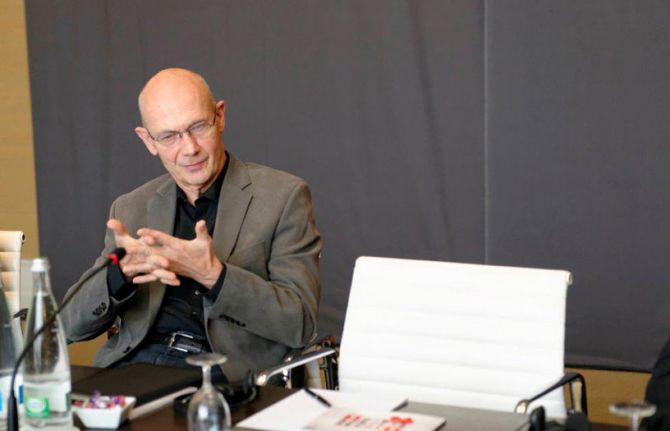
Update
AIDS is everyone’s business
17 March 2015
17 March 2015 17 March 2015The critical role of the business community in Africa’s HIV response was highlighted during a side event held at the Africa CEO Forum in Geneva, Switzerland, on 16 March.
The event sought to renew the commitment of the continent’s business leaders to promoting voluntary and confidential HIV testing for workers and ensuring access to HIV treatment, as well as challenging stigma and discrimination.
It was attended by the chief executives of some of Africa’s largest companies, who heard that business leadership is vital for ending the AIDS epidemic by 2030. It was noted that high-quality workplace HIV policies are not only in the best interests of workers and their families but are hugely beneficial to the companies themselves, with such smart investment leading to a healthier, more productive workforce.
The event also saw the launch of a new publication entitled AIDS is everyone’s business, it includes a collection of messages from top business leaders, several from Africa, highlighting the need to challenge AIDS-related discrimination and to close the gap on HIV testing and treatment.
HIV represents a huge burden to Africa, its companies and its workforce. The continent accounts for 71% of the 35 million people living with HIV worldwide, 69% of new HIV infections and 74% of AIDS-related deaths.
Quotes
“Healthy people are essential to growth and development. We need to make zero HIV in the workplace a reality. Ending AIDS is good business.”
“AIDS will be an unfinished business as long as anyone who’s living with HIV is denied the right to work.”
“Ending the AIDS epidemic by 2030 is possible, but only if efforts are fast-tracked over the next five years. Business leaders are critical partners in fast-tracking HIV testing and in ensuring zero HIV-related discrimination. The future of the AIDS response today is outside the health sector.”
Resources
Related

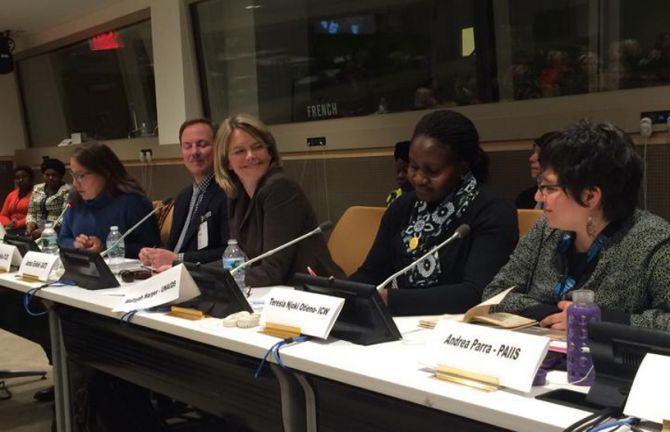
Update
Forced and coerced sterilization: a global violation of human rights
19 March 2015
19 March 2015 19 March 2015UNAIDS and partners called for the elimination of forced and coerced sterilization of women and transgender people at the Commission on the Status of Women (CSW) in New York, United Sates of America.
During a side event hosted on 19 March by UNAIDS, the International Community of Women Living with HIV, Global Action for Trans Equality, the Center on Law and Social Transformation and the Action Program for Equality and Social Inclusion, participants discussed strategies and recommendations to fast-track the end of the practice in the context of the post-2015 development agenda. The dialogue brought together civil society activists, CSW delegates, ministers of gender and United Nations representatives.
The practice of forced and coerced sterilization continues to occur in many parts of the world. The participants discussed how it is a form of institutional violence and a human rights violation, which has been shrouded in silence and protected by societal acceptance.
The practice, however, has been garnering international attention in recent years, with increasing commitment to its elimination affirmed in several statements and resolutions. For example, in November 2014 the Namibian Supreme Court ruled in favour of three women living with HIV who had been subjected to coercive sterilization in public hospitals without their informed consent.
It was also highlighted that the 2014 United Nations interagency statement on eliminating forced, coercive and otherwise involuntary sterilization, to which UNAIDS is a signatory, is also contributing to the global efforts to eliminate this practice by providing guiding principles for prevention and recommendations for legal policy and service delivery.
Quotes
“Eliminating forced and coerced sterilization, which is a fundamental human rights violation, speaks to the heart of UNAIDS’ values, principles and work. It is one of too many sexual and reproductive rights violations.”

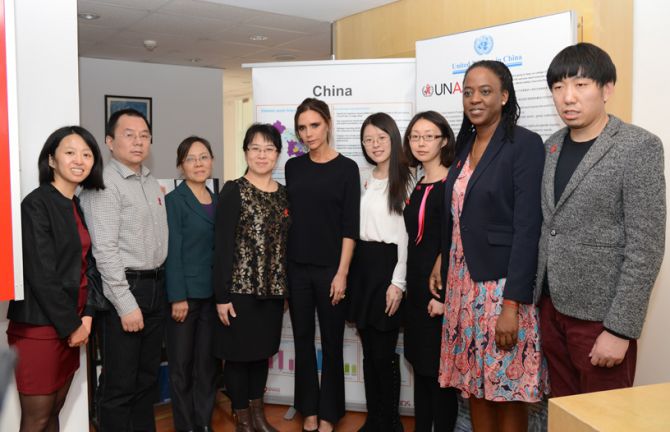
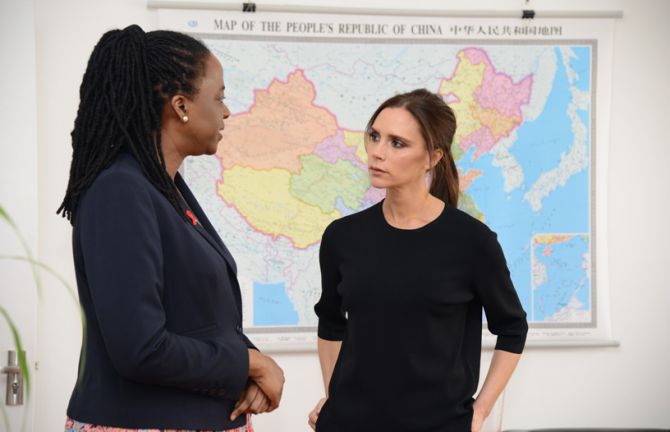
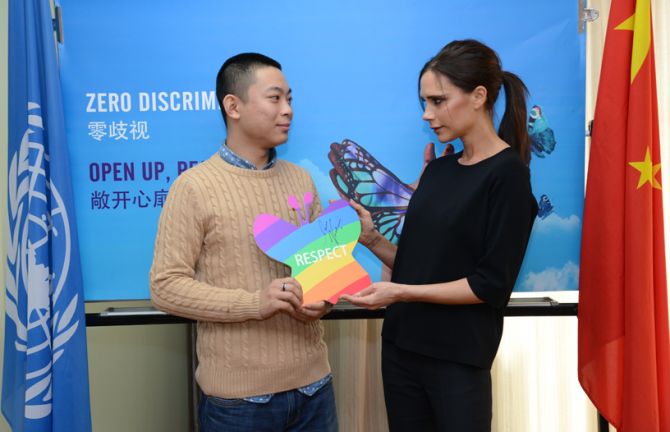
Update
UNAIDS International Goodwill Ambassador Victoria Beckham highlights AIDS response in China
18 March 2015
18 March 2015 18 March 2015During a business trip to Asia, UNAIDS International Goodwill Ambassador, Victoria Beckham, took the opportunity to raise awareness about the region’s AIDS epidemic. In meetings with business leaders, she urged them to increase private sector involvement in the response to HIV to help end the AIDS epidemic by 2030.
Victoria Beckham met with people living with HIV during a visit to the UNAIDS country office in Beijing. She heard from the group that despite progress many people still face stigma and discrimination because of their HIV status. She re-affirmed her support for UNAIDS’ campaign to reach zero discrimination against people living with HIV.
During her trip, Victoria was also a guest of honour at a Hong Kong event organized by the Foundation for AIDS Research (amfAR), which was also attended by long-standing UNAIDS supporters, Serge Dumont and actress, Michelle Yeoh.
Since her appointment as UNAIDS International Goodwill Ambassador in 2014, Victoria has used her business and media platforms to raise awareness and funds for the AIDS response.
Quotes
“Having someone like Victoria Beckham support me and everybody else affected by HIV is so encouraging and means so much.”
“AIDS continues to be a global issue and we all have a role to play as we move towards ending this epidemic. I am proud of my UNAIDS family and it has been another step in my education to spend time with Catherine Sozi and her team, learning about their challenges in Asia and how we can work together towards less discrimination and prejudice, and towards zero new HIV infections and zero AIDS-related deaths.”
“Victoria Beckham’s visit to China is an exciting opportunity to further engage with the business community to advance the AIDS response and end stigma and discrimination against those living with HIV.”
Region/country

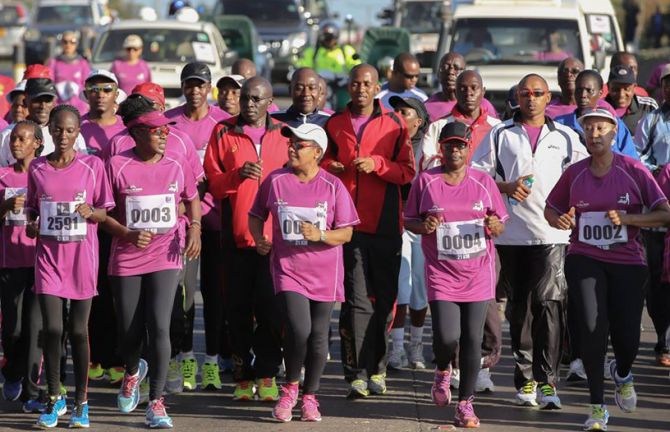
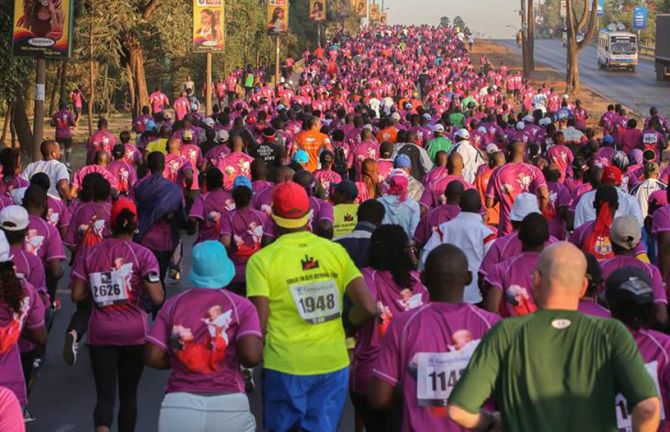
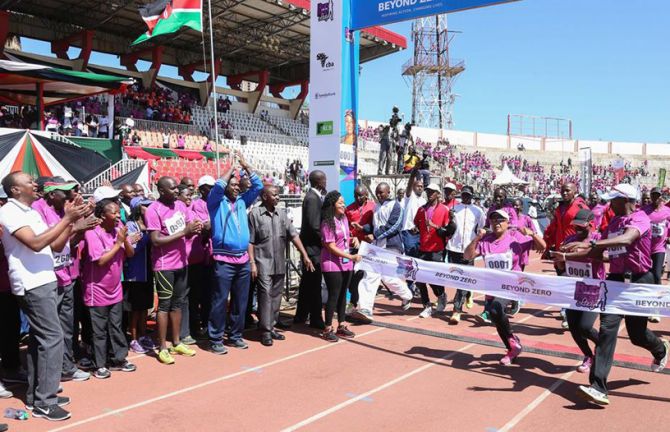
Update
First Lady’s half marathon raises funds on International Women’s Day
08 March 2015
08 March 2015 08 March 2015More than 15 000 Kenyans, including the First Lady, Margaret Kenyatta, took part in the second First Lady’s Annual Half Marathon on International Women’s Day, 8 March, raising more than US$ 4 million.
The money raised will be donated to the Beyond Zero campaign, which aims to improve maternal and child health across Kenya. Since the campaign was launched in January 2014, Beyond Zero has made a significant impact by providing fully equipped mobile health clinics that bring essential services closer to vulnerable communities, including people living in informal settlements.
In recent years, Kenya has made notable progress in improving the health of mothers and children. New HIV infections among children declined from 21 000 in 2009 to 13 000 in 2013. An estimated 63% of pregnant women living with HIV accessed treatment services aimed at preventing mother-to-child transmission of HIV in 2013, but only 31% of children living with HIV had access to antiretroviral treatment in the same year.
Quotes
“Today is International Women’s Day. Thousands of events are held across the globe to celebrate the achievements of women and it is quite appropriate that in our own way we mark this day by running to raise resources to safeguard the lives of children and women in Kenya”.
"As I had promised myself and my fellow Kenyans, I joined the First Lady in the 21 km race to raise awareness for the Beyond Zero campaign and help women and children in my country."
Region/country
Related


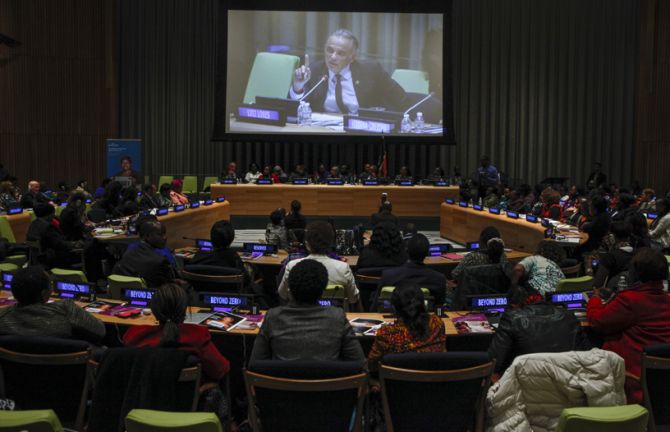
Update
Accelerating action to stop new HIV infections among children in Kenya
13 March 2015
13 March 2015 13 March 2015At the fifty-ninth session of the Commission on the Status of Women, being held in New York, United States of America, a Kenyan campaign to stop new HIV infections among children has been highlighted as an example of what committed political leadership can achieve in improving women’s access to health care.
The First Lady of Kenya, Margaret Kenyatta, launched her Beyond Zero campaign to improve maternal health and stop children being born with HIV in 2014. Less than a year later, 18 mobile health clinics are now serving some of the country’s most affected communities, with many more planned to open soon.
Ms Kenyatta raised some of the initial funding for the campaign by running in sponsored marathons. She inspired around 30 000 people to join her, propelling the elimination of mother-to-child transmission of HIV to the top of the country’s health agenda.
Last month, the President of Kenya, Uhuru Kenyatta, also pledged the country’s support and leadership for the global All In campaign to end adolescent AIDS, which was launched in Nairobi in March 2015.
Quotes
"In today's world, gender equality and women's empowerment are no longer privileges. They are rights that every woman should enjoy. I call on all leaders to ensure reducing child mortality, improving maternal and child health and combating HIV/AIDS and other diseases are part of the post-2015 agenda."
"AIDS is the leading cause of death globally among women of reproductive age. It is a women's issue. This event, under the leadership of Kenya's First Lady, Margaret Kenyatta, brings hope to all of us. We will continue to support you and we will continue to learn from you."
Region/country
Related

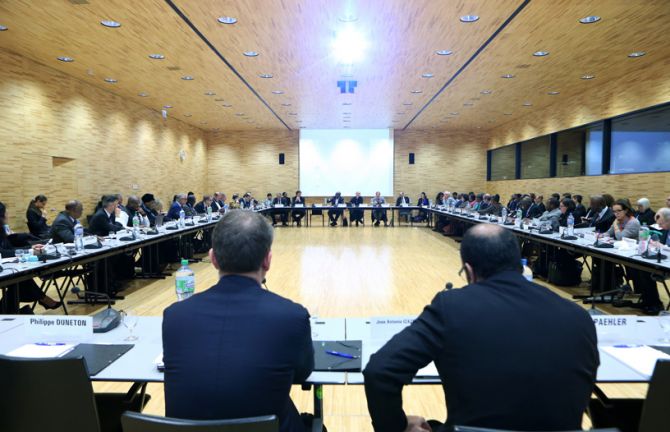
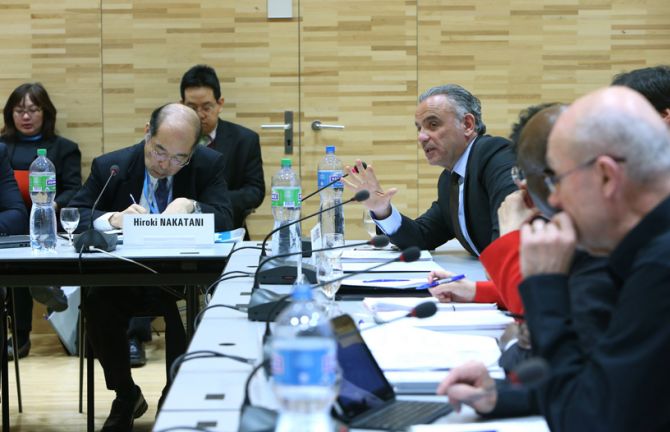
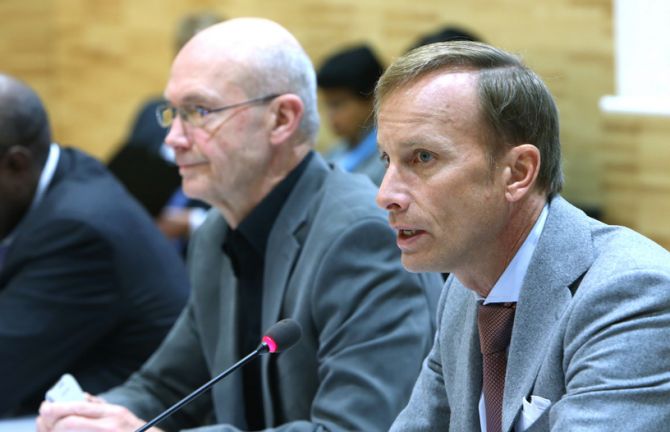
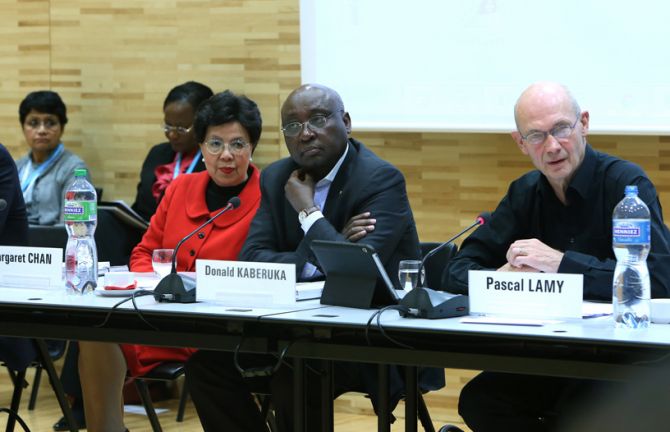
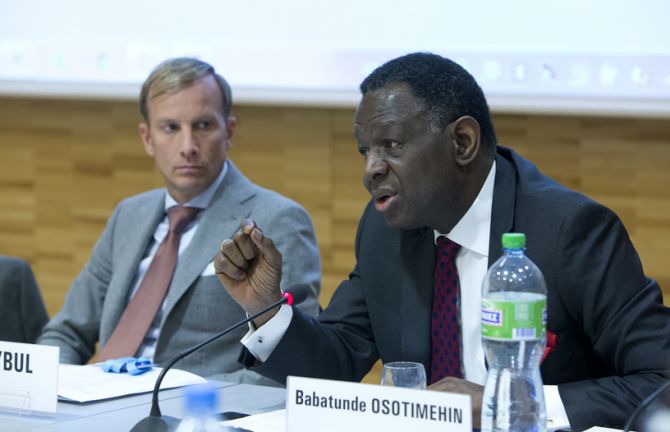
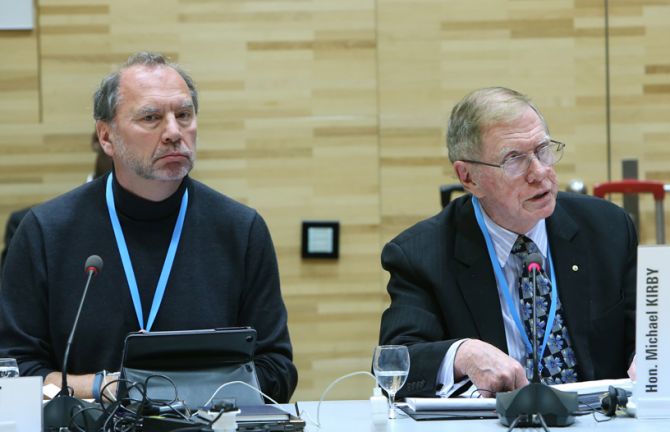
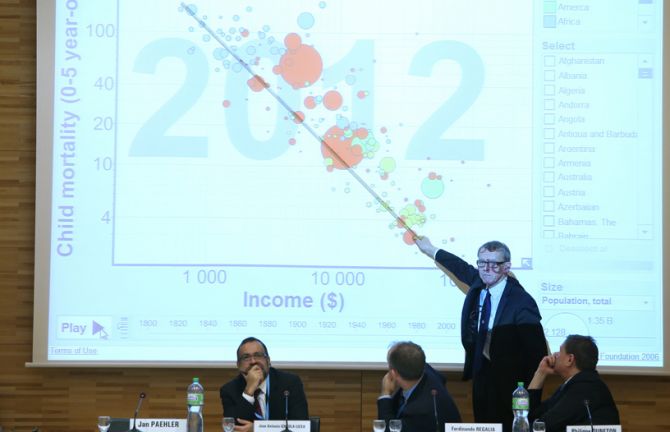
Update
Global Health Partners Begin Building a New Approach to Ensure Equitable Access to Medicines
26 February 2015
26 February 2015 26 February 2015Global health partners met in Geneva to begin the process of building a new approach to better determine health needs and constraints and addressing them in countries.
The new framework, the Equitable Access Initiative, aims to better inform international decision making processes on health and development, particularly where they rely on traditional gross-national-income classification as a measure of where to invest global health resources.
Relying solely on gross national income to determine investment priorities in global health has been increasingly questioned by partners.
Economic growth is lifting many countries from low- to middle-income status, yet those classifications and criteria may be too simple to capture overall needs and capacities.
Countries classified as middle-income are often in need of substantial resources to respond to disease burden, as a steadily larger percentage of those affected by the diseases live in middle-income countries.
Participants in the meeting discussed how the absence of new strategies to ease the transition of countries from low-income to middle-income status has led to a substantial risk of countries not being able to maintain or improve health outcomes. The initial meeting of the Equitable Access initiative was held on 23 February 2015 and co-chaired by Pascal Lamy, the Honorary President of Notre Europe, and Donald Kaberuka, the President of African Development Bank Group. The meeting, hosted by the WHO, was co-convened by Gavi, the Vaccine Alliance; The Global Fund to Fight AIDS, TB, Malaria; UNAIDS; UNICEF; UNDP; UNFPA; UNITAID; WHO and the World Bank.
The meeting looked at a process of engagement that may culminate in recommendations on how to support countries as they make vital health investments as they transition from low-income to middle-income status.
The Equitable Access Initiative seeks to establish a new way to measure a country's health needs and capacities, aimed towards sustainability, and in addition to propose nuanced health classifications that go beyond traditional economic metrics such as national income levels and are more relevant for better health outcomes. The initiative will be firmly grounded in human rights and will uphold the need for zero discrimination in access to medicines and health services.




Update
Closing the HIV testing gap in southern and eastern Africa
13 March 2015
13 March 2015 13 March 2015An HIV testing and counselling campaign in Botswana, South Africa and United Republic of Tanzania has set a new Guinness World Record by testing 4367 people over an 8-hour period.
Teams worked across 20 testing sites in Maun District, Botswana, Dar es Salaam, United Republic of Tanzania, and Gauteng and KwaZulu-Natal provinces in South Africa. The campaign, which was intended to increase the number of people aware of their HIV status and, if necessary, refer people to HIV treatment and care services, broke the previous Guinness World Record, which was held by Argentina.
In 2013, there were around 1.1 million new HIV infections in eastern and southern Africa. Although HIV prevalence among young women aged 15–24 in eastern and southern Africa was about 40% lower in 2013 than a decade ago, HIV prevalence remains high among this age group—an estimated 3.7% in 2013—about twice that of young men.
Quotes
“This is a true testament of the coordination and mobilization of local resources to achieve a magnificent result within such a short period of time. We hope to do more in actively involving civil society organizations and the community to achieve greater outcomes.”
“Keeping HIV testing at the forefront of every South African’s mind will be critical as we roll out our civil society testing campaign as part of the national HIV counselling and testing revitalization plan.”
“This campaign addressed one of the major challenges in the national AIDS response. An estimated one of three adults in Botswana have never tested for HIV and do not know their HIV status. This is an initial step in reaching the Fast-Track Targets; the lessons learned will shape future efforts in promoting HIV testing and counselling and the links with treatment and care services.”
‘’I decided to get tested so that I could be aware of my HIV status. I have big dreams that I would like to achieve in life like everybody else and I want to stay healthy and prevent myself from HIV infection. I also encourage my friends and fellow young people to go for HIV testing regularly and take control of their lives.’’
Related

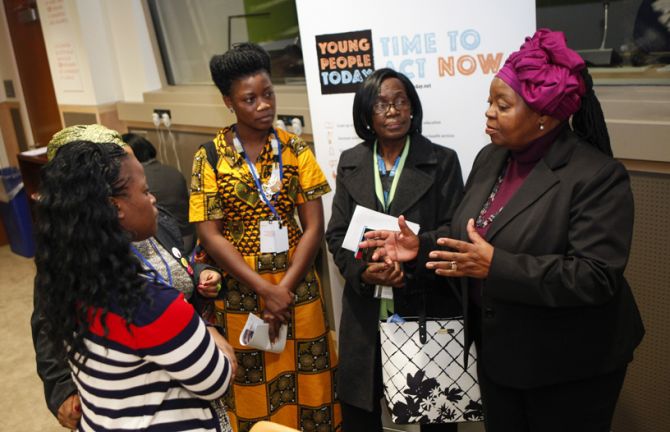
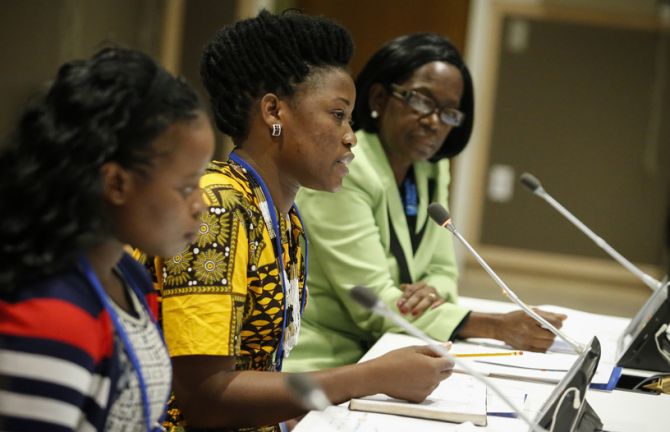
Update
Changing the prospects for women and girls in eastern and southern Africa
12 March 2015
12 March 2015 12 March 2015A joint event organized by UNAIDS and the United Nations Educational, Scientific and Cultural Organization held during the fifty-ninth session of the Commission on the Status of Women, in New York, United States of America, has shined the spotlight on the health, social and legal services available to women and girls in eastern and southern Africa.
Participants attending the session heard Sheila Tlou, UNAIDS Director for the Regional Support Team for Eastern and Southern Africa, highlight the progress made and challenges ahead in scaling up access to sexuality education and health services for women and girls in the region.
Professor Tlou said many countries had made notable progress in putting young people, particularly young women and girls, at the centre of their national health and development agendas. Adopted in December 2013, the Eastern and Southern Africa Ministerial Commitment brought together ministers of education and health from 20 countries to pledge acceleration of the delivery of sexuality education and sexual reproductive health programmes for young people.
However, young women and girls in eastern and southern Africa continue to face a higher risk of HIV infection. In 2013, women in eastern and southern Africa accounted for 59% of all adults living with HIV. An estimated 230 000 young women between 15 and 24 years of age were newly infected with HIV in the same year. Violence against women, the high rate of teenage pregnancy, poverty and gender inequalities are some of the reasons that young women and girls are at risk of poor health outcomes, including HIV.
Participants recommended that specific goals and targets for women and girls be included in the post-2015 agenda, including increasing access to education, ending child and forced marriage, and halting gender-based violence.
Quotes
“Education has a protective effect against HIV, against unintended pregnancy and against early marriage. That can only be realized if we ensure that more girls and young women are enrolled and complete primary education and continue to secondary education. To make this happen requires bold action, but it is doable and it needs to be done now.”
“There is an urgent need to focus on young people between the ages of 15-24 as they are most affected and have the highest rate of mortality due to HIV.”
“Fast-tracking access to quality comprehensive sexuality education and sexual and reproductive health services will guarantee a healthier and more resilient future for young women and girls.”
“A simple recommendation for the post 2015 agenda is that we need a target to end child marriage. We must also dare to set targets that deal with teenage pregnancy, HIV, education, women’s empowerment and a whole range of other issues. Change happens if we dare to think differently and do business unusual.”
“I have seen many young women and girls die just because they did not have access to something that is so basic – knowledge. Knowledge they could have obtained if they could read and knowledge that could have saved their lives.”
Related

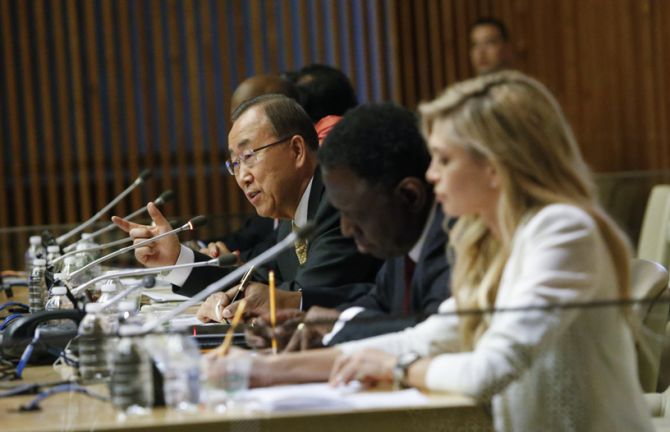
Update
Preventing mother-to-child transmission of HIV is an unfinished task
11 March 2015
11 March 2015 11 March 2015The progress made in global efforts to improve women’s and children’s health was highlighted at an Every Woman Every Child event hosted by the United Nations Secretary-General at the fifty-ninth session of the Commission on the Status of Women, being held in New York, United States of America.
Vera Brezhneva, UNAIDS Goodwill Ambassador for Eastern Europe and Central Asia, spoke alongside the United Nations Secretary-General at the event and reminded panel members and the audience that work is still needed to ensure that every child is born free from HIV.
In 2013, an estimated 240 000 children became infected with HIV and more than three in 10 women living with HIV did not receive the necessary antiretroviral treatment to prevent transmitting the virus to their child.
During the debate, Ms Brezhneva highlighted the need to focus on the unmet needs of women, children and adolescent girls, especially among populations most affected by HIV. She also called for the removal of barriers that stopped women accessing essential sexual and reproductive health-care services.
At the event, the United Nations Secretary-General, Ban Ki-moon, launched his progress report on the Global Strategy for Women’s and Children’s Health 2010–2015, highlighting that the world now has a historic opportunity to end preventable maternal, child and adolescent deaths.
Quotes
“Our task now is to maintain and build on the momentum, complete the unfinished health MDGs, end the appalling tragedy of preventable deaths and invest in the future of women, children and adolescents.”
“We have great progress to build on. The Global Plan to eliminate new HIV infections among children by 2015 and to keep their mothers alive has mobilized leaders, partners, mothers—and fathers. From small steps, we are now making great strides.”
















